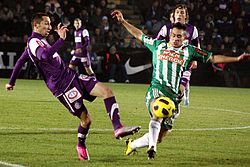Between World Wars
Rapid became a dominant force during the years between the world wars, an era in which Austria was one of the leading football nations on the continent. It won its first hat-trick of titles from 1919 to 1921. [4] After the annexation of Austria to Germany in 1938, Rapid joined the German football system, playing in the regional first division Gauliga Ostmark along with clubs such as Wacker Wien and Admira Vienna. Rapid would be the most successful of these clubs. They won the Tschammerpokal, predecessor of today's DFB-Pokal, in 1938 with a 3–1 victory over FSV Frankfurt, and followed that with a German Championship in 1941 by defeating Schalke 04, the most dominant German club of the era. The team was able to overcome a 3–0 Schalke lead to win the match 4–3.
Post-World War II
As the winners of the 1954–55 season, Rapid were Austria's entrant for the inaugural European Cup in the following season. They were drawn in the first round against PSV and opened with a 6–1 home victory, with Alfred Körner scoring a hat-trick. Despite losing the away leg 1–0, the club still advanced to a quarter-final, where they started with a 1–1 home draw against Milan before being defeated 7–2 in the away match at the San Siro to lose 8–3 on aggregate. [5]
Rapid's best performance in the European Cup came in the 1960–61 season when they reached the semi-final before being eliminated by eventual winners Benfica, 4–1 on aggregate. Previously, in the quarter-final the club required a replay to eliminate East German club Aue from the tournament after a 3–3 aggregate draw. The away goals rule would have seen Aue advance without needing the replay, held at the St Jakob Park in neutral Basel. [6]
The club was involved in a controversial episode in 1984 when they eliminated Celtic from the last 16 of the European Cup Winners' Cup. Celtic were leading 4–3 on aggregate with 14 minutes left in the match when Rapid conceded a penalty. As the Rapid players protested to the match officials, their defender Rudolf Weinhofer then fell to the ground and claimed to have been hit by a bottle thrown from the stands. However, television images clearly showed that a bottle was thrown onto the pitch and did not hit Weinhofer. The match finished 4–3, but Rapid appealed to UEFA for a replay, and both teams were fined. The replay appeal was turned down initially, but Rapid appealed for a second time. On this occasion, Rapid's fine was doubled but UEFA also stipulated the match be replayed 160 kilometres (100 mi) from Celtic's ground. The game was held on 12 December 1984 at Old Trafford, Manchester, and Rapid won 1–0 through a Peter Pacult strike. [7]
Rapid reached its first European final in 1985, losing 3–1 in the Cup Winners' Cup Final to Everton in Rotterdam. Eleven years later, in the same tournament's final in Brussels, Rapid lost 1–0 to Paris Saint-Germain. [8]
Rapid last reached the group stage of the UEFA Champions League in 2005–06 after beating F91 Dudelange of Luxembourg 9–3 on aggregate and then defeating Lokomotiv Moscow 2–1 on aggregate in a play-off after a 1–0 victory in Russia. They eventually finished last in their group after losing all of their matches against Bayern Munich, Juventus and Club Brugge. [9]
In 2015, the Rapid youth team took part [10] in the third season of the Football for Friendship international children's social program, the final events of which were held in Berlin. [11]







